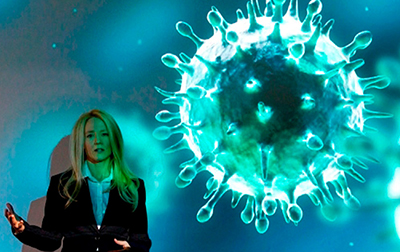Interview with Dr. Trounce, Director of Stanford Biosecurity
The recent spread of the Wuhan coronavirus has awakened people′s attention to the dangerous nature of infectious diseases worldwide. How did it start, how did it spread so quickly, and how can we protect ourselves from it? Many questions have been raised and need to be addressed. Recently I had the honor to speak with Dr. Milana Boukhman Trounce from Stanford Health Care and School of Medicine. Dr. Trounce specializes in biosecurity, and has taught courses on the subject at the school for many years. She also established the Stanford Biosecurity Center to address issues related to infectious disease epidemics.

Dr. Trounce attended UC Berkeley for her undergraduate study, and went on to study medicine at UCSF. She attended Harvard for her residency, and also taught a course titled″Responding to Nuclear, Biological, and Chemical Weapons″. Following her time at Harvard, she became the Assistant Clinical Professor of Medicine at UCSF while pursuing an MBA at Stanford University. Presently, she works in the Department of Emergency Medicine at Stanford Health Care, and as a Clinical Professor at the Stanford School of Medicine.
With all of her training and experience in medicine and bio-disaster, Dr. Trounce felt the urgency to establish Stanford Biosecurity, an educational organization within Stanford School of Medicine to establish awareness and preparedness against the rising threats of infectious organisms. Her mission is to bring leading experts from the government, and from the business, healthcare, and educational sectors to create practical solutions to answer these pressing needs in order to protect the nation and the world from infectious diseases, whether intentionally released or naturally occurring. Educating decision-makers is the key to guaranteeing success in this.
Every year, Dr. Trounce teaches an introductory course on biosecurity at Stanford, and it has been growing in popularity. Last year alone, close to 200 people attended. Each week, Dr. Trounce invites eminent experts and decision-makers in the biosecurity field to teach and have a discussion with the students. Some students have gone on to work with these experts on published studies. Last year, she started a BioSecurity hackathon at Stanford to not only increase awareness, but to provide an opportunity for the creation of practical solutions. This year the BioSecurity Hackathon started a week after the world got the news of the Wuhan coronavirus outbreak.
The spread of the new Wuhan coronavirus highlights the need for proper preparedness against infectious diseases. The term coronavirus is not the name of the disease, but rather the name of a family of viruses. These viruses can affect both animals and humans, and are sometimes, but not always, deadly. These infections often cause irritation to the upper respiratory system, and have symptoms similar to that of a bad cold, and these illnesses can progress to serious, even lethal, pneumonias. Both SARS and MERS are examples of deadly coronaviruses. The Wuhan strain (2019-nCoV) is believed to have originated in bats which pass the virus to humans or pass through other animals before they are passed on to humans. Infected animals appear in animal markets in China and given the proximity of which appear frequently in animal markets in China. Based on preliminary data, this disease spreads extremely rapidly and has a 2% mortality rate, although additional epidemiological data are needed to determine the true mortality rate and rate of spread.
Dr. Trounce suggests that the best way to avoid infection is to stay away from crowds, wear a mask, have frequent handwashing, avoid touching your face and eyes or potentially infected surfaces. As this is a novel virus without a working vaccine, the most important step individuals can take is to try and prevent getting sick in the first place. Luckily, the virus does not have a significant presence in the US, so precautions such as these are not yet necessary for Wuhan coronavirus, but are helpful to prevent catching flu and other respiratory viruses.
Dr. Trounce believes the central government of China has made some impressive accomplishments in handling the Wuhan virus outbreak. The Chinese government is imposing an aggressive quarantine on all of its citizens in the Wuhan area. Generally, the earlier a quarantine is imposed, the more effective it is. For example, during the SARS outbreak, one infected patient caused an outbreak in the city of Toronto, which lead to about 250 people infected and 44 deaths from this virus. With Wuhan coronavirus outbreak, things are not so simple since based on some preliminary data, it appears that asymptomatic patients can transmit the illness, making quarantines and isolations more challenging and potentially less effective. Another impressive feat is that China built very large hospitals in a period of days, which would have been an impossible feat in the US.
This month, Dr. Trounce is traveling to DC to participate in the National Academy of Sciences Forum related to biosecurity issues. She believes it is imperative for the global community to come together to enhance our society′s resilience to infectious disease threats. She believes this would be best accomplished in an interdisciplinary fashion where policy, technology and healthcare experts and all the stakeholders come together to develop the most effective approaches to biosecurity threats. This is the inspiration behind the creation of the BioSecurity center at Stanford.

Recommendations for protection against infectious diseases:
* Stay home when sick.
* Cough or sneeze into your tissue, sleeve, or arm. Do not use your hands.
* Wash your hands often with soap and water for at least 20 seconds. If soap and water are not available, use an alcohol-based hand sanitizer.
* Avoid touching your eyes, nose, and mouth with unwashed hands.
* Don′t share food and drinks.
* Clean and disinfect shared surfaces and objects that are touched frequently (e.g. doorknobs, desks, phones).
* If you can, avoid close contact with anyone with cold or flu-like symptoms.
* Get a flu shot. We strongly recommend that everyone obtain seasonal flu vaccination. While it will not prevent 2019-nCoV, influenza is currently in widespread circulation in California, and initial symptoms can be similar to novel coronavirus. Any illness right now can increase anxiety and concerns.